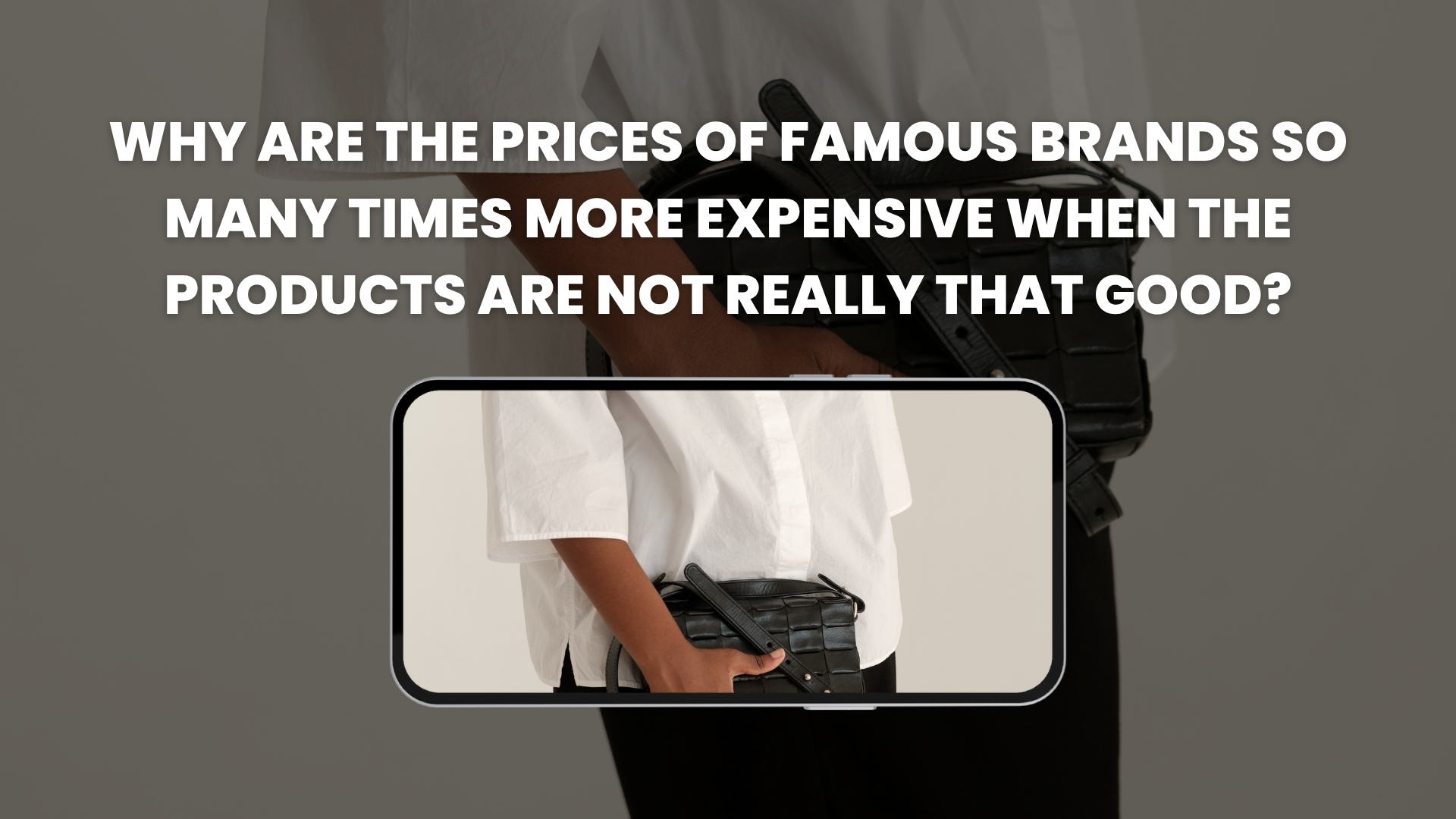Have you ever walked into a store, picked up a product from a famous brand, checked the price tag, and wondered, “Why is this so expensive?” Even more puzzling, sometimes the quality doesn’t seem to match the hefty price. Whether it’s designer clothing, luxury handbags, or high-end electronics, the price difference between famous brands and lesser-known alternatives can be staggering. This phenomenon leaves many consumers questioning: Why are the prices of famous brands so many times more expensive when the products are not really that good?
In this article, we’ll dive deep into the reasons behind the high prices of famous brands. We’ll explore the power of branding, the psychology of consumer behavior, the impact of marketing, and the hidden costs embedded in luxury products. By the end, you’ll have a clear understanding of what you’re really paying for when you choose a famous brand over a generic alternative.
The Real Reasons Behind High Prices of Famous Brands

The Power of Branding
Branding is much more than just a logo or a catchy slogan. It’s about creating a perception in the minds of consumers. Famous brands like Gucci, Apple, or Nike have spent decades building an image of quality, prestige, and desirability. This brand image allows them to command higher prices, regardless of the actual product quality.
How Branding Adds Value
- Trust and Reliability: Consumers often associate famous brands with reliability, even if the product isn’t objectively better.
- Status Symbol: Owning a product from a well-known brand can signal wealth, taste, or social status.
- Emotional Connection: Many brands create emotional bonds with their customers through storytelling and consistent messaging.
The Role of Marketing and Advertising
Famous brands invest heavily in marketing and advertising. From celebrity endorsements to high-budget commercials, these efforts create buzz and keep the brand top-of-mind. The costs of these campaigns are often passed on to the consumer, contributing to higher prices.
Marketing Tactics That Drive Up Prices
- Celebrity Endorsements: Big names don’t come cheap, and their association with a brand can significantly inflate product prices.
- Exclusive Events: Fashion shows, product launches, and pop-up shops add to the brand’s allure—and its expenses.
- Influencer Partnerships: Social media influencers are paid to promote products, further increasing marketing costs.
Perceived Value vs. Actual Value
One of the main reasons famous brands can charge more is the concept of perceived value. This is the value a customer believes a product has, which may be much higher than its actual production cost or functional value.
Factors Influencing Perceived Value
- Packaging and Presentation: Luxurious packaging can make a product feel more valuable.
- Store Experience: High-end stores offer personalized service and an exclusive atmosphere.
- Scarcity and Exclusivity: Limited editions or “members-only” products create a sense of urgency and uniqueness.
The Psychology of Pricing
Pricing strategies play a huge role in how consumers perceive a product. High prices can actually make a product seem more desirable, a phenomenon known as the “price-quality heuristic.”
Psychological Pricing Strategies
- Prestige Pricing: Setting prices high to reinforce the perception of luxury and exclusivity.
- Anchoring: Displaying a very high “original” price next to a “discounted” price to make the latter seem like a bargain.
- Decoy Effect: Offering a super-expensive option to make other high-priced items seem more reasonable.
Production Costs and Quality: The Hidden Truth
While some famous brands do use higher-quality materials and craftsmanship, many rely on the same factories and suppliers as less expensive brands. The difference in production cost is often minimal compared to the markup.
Where the Money Really Goes
- Research and Development: Some brands invest in innovation, but not all.
- Distribution and Logistics: Premium brands may have more expensive supply chains.
- Brand Protection: Legal fees to protect trademarks and fight counterfeits can be substantial.
Social Proof and Herd Mentalitys are social creatures. When we see celebrities or peers using a certain brand, we’re more likely to want it ourselves. This “herd mentality” can drive up demand—and prices.
Examples of Social Proof
- Celebrity Sightings: A celebrity spotted with a certain handbag can cause a spike in sales.
- Online Reviews and Ratings: High ratings can justify higher prices, even if the product isn’t objectively better.
Comparison: Famous Brands vs. Generic Brands
| Feature | Famous Brands | Generic Brands |
|---|---|---|
| Price | High | Low to Moderate |
| Brand Recognition | Global | Limited |
| Perceived Quality | High | Variable |
| Actual Quality | Sometimes similar | Sometimes similar |
| Marketing Investment | Very High | Low |
| Packaging | Luxurious | Basic |
| Store Experience | Exclusive | Standard |
| Social Status | High | Neutral |
Are Famous Brands Worth the Price?
Pros of Buying Famous Brands
- Consistent Quality (sometimes)
- Prestige and Status
- Better Customer Service
- Resale Value
Cons of Buying Famous Brands
- Overpaying for Perception
- Not Always Better Quality
- Paying for Marketing, Not Materials
How to Make Smart Purchasing Decisions
If you’re debating whether to buy a famous brand or a generic alternative, consider the following tips:
- Research Product Reviews: Look for unbiased reviews that compare famous brands with lesser-known options.
- Examine Materials and Construction: Sometimes, generic brands offer similar or even better quality.
- Consider Your Priorities: Is status important to you, or do you value function over form?
- Set a Budget: Decide how much you’re willing to pay for branding versus actual product features.
FAQ
Why do people still buy expensive famous brands?
People buy famous brands for various reasons: perceived quality, social status, emotional connection, and the desire to fit in or stand out. Marketing and social proof also play significant roles.
Are famous brands always better quality?
Not necessarily. While some famous brands invest in superior materials and craftsmanship, many use similar suppliers and manufacturing processes as generic brands. The perceived quality often outweighs the actual difference.
Is it ever worth paying more for a famous brand?
It depends on your priorities. If you value status, customer service, or resale value, it might be worth it. However, if you’re focused on functionality and value for money, generic brands may suffice.
How much of the price is due to marketing?
A significant portion of the price for famous brands goes towards marketing, advertising, and brand-building activities, rather than production costs.
Can generic brands offer the same experience?
In many cases, yes. Generic brands can provide similar functionality and quality at a fraction of the price, though they may lack the prestige and customer service of famous brands.
Conclusion
Famous brands charge significantly higher prices not necessarily because their products are vastly superior, but because of the value they’ve built through branding, marketing, and consumer psychology. When you buy a famous brand, you’re paying for more than just the product—you’re investing in a story, a status symbol, and an experience.
